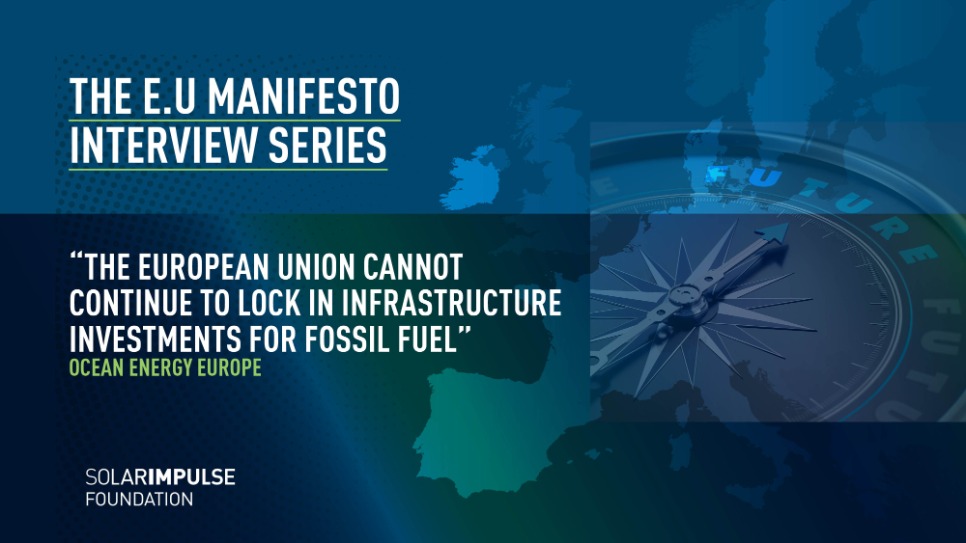News - April 3, 2024
"The EU cannot continue to lock in infrastructure investments for fossil fuel"


Written by Alessandro Gaillard 2 min read
The EU Manifesto Interviews
In March, the Solar Impulse Foundation published its E.U Manifesto : Modernise to Thrive. The Manifesto, counting with the contribution of more than 40 stakeholders, is grounded in the steadfast belief that an efficient and resolute implementation of the Green Deal can and will come with multiple collateral benefits. One of these stakeholders is Ocean Energy Europe. We sat down with its CEO, Rémi Gruet, to talk about the role of finance on the matter.
Solar Impulse : Financing will be key to accelerate the transition. Public and private money will need to be mobilised. Regarding public funds, does the European Union need to equal his global competitor or are there other ways for the EU to maintain global competitiveness?
Rémi Gruet : Innovation has always been a secure way to compete internationally and avoid seeing the EU market flooded by products manufactured without concern for social, environmental and climate rules. Innovative technologies can deliver progress and made in Europe products and infrastructure that withstand dumping or subsidy threats from abroad. Ocean energy is a great example of this, with 80% national content and 100% EU content in any machine the sector put in the water so far.
Public funding is key to attract private investments. Looking at tidal or wave farms, public funding lowers the overall need for private capital, making it easier to find the remaining investment. It also avoids loan interests or equity dividends that can amount to 50% of kWh costs compared to projects that would be purely privately financed.
Regarding private funding, how do we mobilise them? What are the current barriers and how can we overcome them?
Private finance needs a business case. Without public subsidy, there is no business case for innovative renewables that are not commercial yet, such as wave or tidal energy. The sector has recently seen a wave of private investment from both power utilities and oil&gas companies, all looking at investigating this new market. This happened right after the UK put a subsidy per kWh of tidal energy produced and France also subsidised a large pilot farm while EU money flowed to both wave and tidal projects. Coincidence? Obviously not.
Can we continue subsidising and financing fossil fuels while increasing financing to cleantech? Is it coherent? What are the barriers to stoping subsidising and financing fossil projects?
Subsidies to fossil fuel must end but beyond subsidies, any investment in fossil fuel must end, as soon as possible. Europe cannot continue to lock in infrastructure investments for fossil fuel that will be stranded assets in the coming years. The current shift away from gas, not only Russian gas, is sensible. Over 90% of the EU’s oil and gas is imported, making investments and subsidies for these technologies essentially a tool for political pressure from outside, as we have clearly seen recently with Ukraine.
Of course coal remains a socially sensitive sector in some EU countries and care must be taken that training/re-skilling programmes can help coal workers move to jobs in renewable energy. But a strong push from those governments is needed to make that happen. “We’ve always extracted coal” cannot be a valid excuse to not transition to climate-friendly, home-grown renewable energies.

Written by Alessandro Gaillard on April 3, 2024
